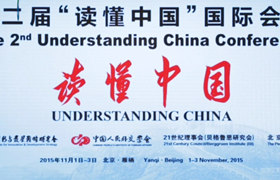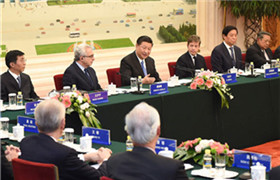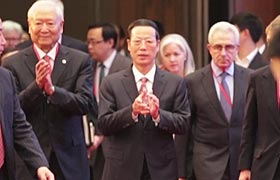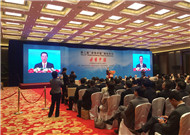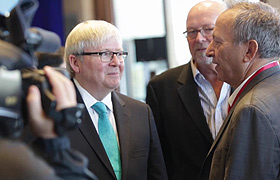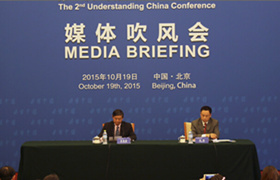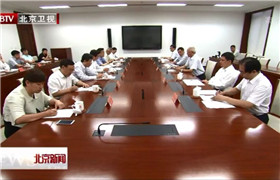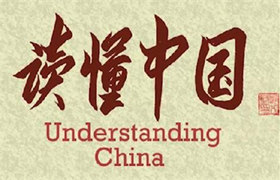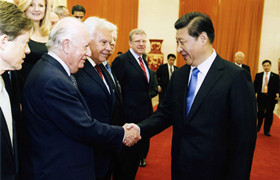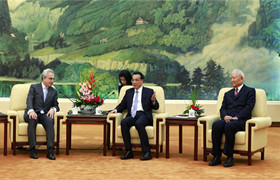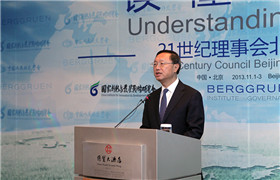- HOME--> Chairman
-
Firmly Grasp the Theme of the 18th CPC National Congress
Source:
Zheng Bijian
The 18th National Congress of the Communist Party of China (CPC) has come to a successful conclusion. It is a very important congress held at the time when China has come to a critical stage of building a moderately prosperous society in all respects, and has therefore attracted great attention both at home and abroad. The theme of this congress, as the banner, soul and spirit of the whole event, has been clearly defined at the beginning of the Report to the 18th National Congress. Hence, the key to study and practice the spirit of the 18th CPC National Congress is to deeply understand and firmly grasp its theme. Only in this way can we be systematic, strategic and comprehensive in carrying out the tasks laid out in the Report and develop the great cause of socialism with Chinese characteristics to a historical new level in the second decade of the 21stcentury.
Hu Jintao, the General Secretary of CPC said in the Report to the 18th CPC National Congress: “the theme of this Congress is to hold high the great banner of socialism with Chinese characteristics, follow the guidance of Deng Xiaoping Theory, the important thought of Three Represents and the Scientific Outlook on Development, liberate the mind, implement the policy of reform and opening up, pool our strength to overcome great difficulties, firmly march on the path of socialism with Chinese characteristics, and strive to complete the building of a moderately prosperous society in all respects.”
By referring to “holding high the great banner of socialism with Chinese characteristics and following the guidance of Deng Xiaoping Theory, the important thought of Three Represents and the Scientific Outlook on Development”, the Party has clearly stipulated the banner that the CPC must uphold at this decisive stage of completing the building of a moderately prosperous society in all respects.
By referring to “firmly marching on the path of socialism with Chinese characteristics”, the Party has made it very clear the path that the CPC must follow at this decisive stage.
By referring to “liberating the mind, implementing the policy of reform and opening up, pooling our strength to overcoming great difficulties”, the Party has decided on how it is going to complete its tasks at this decisive stage.
By referring to “striving to complete the building of a moderately prosperous society in all respects”, the Party has clearly established the goal that it will achieve in the next five to ten years.
It is very important that these four fundamental points, each bearing on the overall development of the Party and the country, have featured prominently in the theme of the Congress at this particular moment in time. They represent an in-depth analysis and keen observation of the global, national and Party conditions, an insightful summary and embodiment of the long-term practice of the Party and people, a formal response to the wishes and aspirations of all the Party members and people of all ethnic groups, and also a clear declaration of the fundamental direction that China will pursue in the second decade of the 21st century and beyond to the international community.
The Theme, Banner and Path of the Congress
It was solemnly decided at the 18th CPC National Congress that the Scientific Outlook on Development be included as the CPC’s guiding principles, as clearly seen in the text of the report--- “hold high the great banner of socialism with Chinese characteristics and follow the guidance of Deng Xiaoping Theory, the important thoughts of Three Represents and the Scientific Outlook on Development”.
That was an overarching decision of great historic importance.
To be more specific, it is another major historic decision made by the Party since the 12th CPC National Congress when we decided on “following our own road and building socialism with Chinese characteristics” as a distinctive theoretical and practical theme of the party in the new era of reform and opening up and socialist modernization. The decision is also based on the decade long successful experience of building China into a moderately prosperous society in all respects since the 16th CPC National Congress. It is a major historic decision made by the Party in the second decade of the 21st century when the world, the country and the Party are experiencing profound and complicated changes, when we are faced with unprecedented opportunities and challenges and when China remains in a period of important strategic opportunities, in which much can be achieved. It is also a major historic decision made at the critical moment when a new Central Committee has just taken over leadership to build on the past achievement and open up new ground.
Therefore, this is a significant, remarkable, extraordinary and far-reaching decision that the Party has made.
In essence, this major overarching historic decision has fully demonstrated that the theoretical system of socialism with Chinese characteristics, or contemporary Marxism adapted to Chinese realities, always keeps pace with the times and never stays rigid. For that reason, the Scientific Outlook on Development, together with Deng Xiaoping Theory and the important thought of Three Represents, has become the great banner for China’s development and progress, for the solidarity and struggle of the Party and people of all ethnic groups, and for the Party and Chinese people to emerge from all sorts of tests and challenges victoriously during the great course of practice.
That is how the CPC has been forging ahead in the new era of reform and opening up and socialist modernization.
Here is a brief review of the history of the Party over the past three decades since the third plenary session of the 11th CPC Central Committee, highlighting how the Party has made correct judgment of the overall situations and opened up new ground.
At the late 1970s and early 1980s, the decade long catastrophic “Cultural Revolution” left China a collapsing economy, turbulent political situation and poorly fed and clothed people. The Party then made an extraordinary historic decision of shifting the focus of the Party and country to economic development and reform and opening up. It established the guiding principle of socialism with Chinese characteristics (or Marxism integrated with Chinese realities) and the basic line in the primary stage of socialism, uniting the Party and people of all ethnic groups to successfully blaze the trail of socialism with Chinese characteristics. As a result, the Party and the country successfully emerged from the severe disaster of the “Cultural Revolution” in just a few years. That was the first “decade” of the new era.
In the late 1980s and early 1990s, amidst the collapse of the Soviet Union, the upheaval of the Eastern Europe, the severe setbacks with the international socialist movement and the serious domestic political disturbance, again the Party steadfastly adhered to socialism with Chinese characteristics, established the basic guideline and experience based on new practice, formulated the reform goals and the basic framework of the socialist market economic system, and developed the basic economic system and distribution system of the primary stage of socialism, thus opening a new chapter of comprehensive reform and opening up and successfully advancing our socialist cause with Chinese characteristics into the 21st century. That was the second “decade” of the new era.
At the turn of the century, China was put through a series of severe tests and challenges --- the U.S. bombing of the Chinese Embassy in Yugoslavia, the collision between a US surveillance plane and a Chinese jet fighter over the South China Sea, the strategic choice of China to join the World Trade Organization (WTO), the “9/11” terrorist attack in the United States, the international financial crisis in 2008, the European sovereign debt crisis and catastrophic natural disasters domestically, yet the Party was able to cope with these challenges cool-headedly and advantageously and to have seized and made the best of this important period of strategic opportunities. Meanwhile, in the process of building a moderately prosperous society in all respects, the Party strived to make practical, theoretical and institutional innovations, formulated the important theories of scientific development, harmonious development and peaceful development, which collectively formed the blueprint of socialist undertaking with Chinese characteristics. In the meantime, the Party made conscientious effort to improve people’s well-being, promote social justice, and advance the building of a harmonious world. The party also worked hard to improve its capacity of state governance and to maintain its advanced nature and purity so that it is able to uphold and carry forward socialism with Chinese characteristics at a new historical starting point. That is the third “decade” of the new era.
An examination of these three “decades” reveals two great accomplishments in pursuing socialism with Chinese characteristics: one in practice, which is the great historical achievements made in building socialism with Chinese characteristics; and the other in theory, which is the creation of Deng Xiaoping Theory, the important thoughts of Three Represents and the Scientific Outlook on Development. Those theories pioneered the path of socialism with Chinese characteristics, established the theoretical system of socialism with Chinese characteristics and improved the institutions of socialism with Chinese characteristics. Together, those two interrelated and mutually reinforcing accomplishments represent Marxism in development in China today.
Anyone who is unbiased and respectable of history and facts can see that it is under the guidance of socialism with Chinese characteristics, which is a set of pragmatic, pioneering, constructive, contemporary, insightful and innovative theories, that we have turned China into a highly dynamic, rapidly growing and increasingly prosperous country. Vastly different from “doctrines” practiced in some other parts of the world that either result in disturbing political changes or have come to a dead-end, this theory is hugely superior and dynamic.
Having said that, it is necessary to point out that on the basis of the theories and lines formed over the previous six CPC national congresses, the 18th Congress has also added a series of remarkable new features to the great banner of socialism with Chinese characteristics.
First, the Scientific Outlook on Development has been established as a guiding theory of the Party. As a product of integrating of Marxism with the realities of China and of our times, the Scientific Outlook on Development has enriched and further developed the Marxist theory on development with a series of new, closely connected and coherent thoughts, ideas and proposition, pushing our understanding of the laws of socialism with Chinese characteristics to a new level. The inclusion of the theory in the Party’s guiding principles will help the entire Party to conscientiously use the Scientific Outlook on Development as guidance, to continuously explore and grasp the laws of socialism with Chinese characteristics and to achieve new victories in socialism with Chinese characteristics.
Second, the institutions of socialism with Chinese characteristics, like the road and theoretical system of socialism with Chinese characteristics, have been recognized as a fundamental achievement over the past ninety plus years of struggles, creation and accumulation by the Party and Chinese people. The Party has thus made it clear that socialism with Chinese characteristics consists of a “road”, with is the pathway to achieve our goals, a “theoretical system”, which is the guidance to our actions, and the “institutions” which serve as a fundamental guarantee. This new and major theoretic summary not only embodies but will also enhance the confidence of all the Party members and people of all ethnic groups in our socialist road, theory and institutions, so that we will steadfastly forge ahead on the road of socialism with Chinese characteristics.
Third, by including ecological conservation and development in the overall blueprint of socialism with Chinese characteristics, the Party has given it a clear strategic position, thus improving the overall blueprint of socialism with Chinese characteristics and deepening our understanding of the laws of state governance by the Party, of socialist construction and of societal development. This will help us achieve new victories in developing socialism with Chinese characteristics on the new journey of “catching up with the times” in a down-to-earth manner.
By adding those critical new contents to the great banner of socialism with Chinese characteristics, the 18th CPC National Congress has extended the scientific connotation of socialist road with Chinese characteristics and proved that this road is viable and sustainable.
The Theme and Goals
As is known to all, ten years ago, the 16th CPC National Congress made an important strategic decision to “concentrate our efforts in the first two decades of this century to build a moderately prosperous society at a higher level in all respects that will benefit more than one billion Chinese people”. That decision was a direct result of Party’s strategic assessment of the domestic and international situation in the first twenty years of the 21st century. As the Report to the 16th CPC National Congress had noted, “the first two decades of the 21st century, on the whole, represent a crucial period of strategic opportunities that China must firmly seize and make best use of”.
Precisely because the Party had incisively identified, firmly seized and made good use of this important period of strategic opportunities, within ten years from the 16th to the 18th CPC National Congress, it was able to lead the Chinese people, through unremitting effort, to have achieved tremendous progress in developing China’s social productive force, economic power and scientific and technological capability, vastly improved people’s living standard, income and social security coverage, and greatly increased our the comprehensive national strength, international competitiveness and global influence. As a result, China has taken on a new look, rising to be the second largest economy in the world from the sixth place.
Today, the Report to the 18th CPC National Congress has put forward the new goal of “completing the building of a moderately prosperous society in all respects”, which is the result of the Party’s scientific analysis of the profound changes in the situations of the world, the country and the Party and of the underlying opportunities and challenges in the second decade of the 21st century, and also the result of the conclusion of that analysis, which is that China still stands to benefit from the important period of strategic opportunities.
It is incisively pointed out in the Report to the 18th CPC National Congress, “An examination of both the current international and domestic environments shows that China remains in an important period of strategic opportunities for its development, a period in which much can be achieved. We need to have a correct understanding of the changing nature and conditions of this period, seize all opportunities, respond with cool-headedness to challenges, and gain initiative and advantages to win the future and attain the goal of completing the building of a moderately prosperous society in all respects by 2020.” That’s to say, the key to seizing the opportunities in the next ten years, and turning pressure into motivation and challenges into opportunities to realize our grand goal of completing the building of a moderately prosperous society lies in our understanding and actions in the new situation in which immense changes are happening. By comprehensively examining and accurately grasping the development trends in China and in the world as well as the new requirements of national development and new expectations of our people, by scientifically formulating the action plans and policies that conform to the needs of the times and the wishes of the people, and by working even harder, more conscientiously and more appropriately, we will be able to further promote scientific development and social harmony, improve people's livelihood and wellbeing, and complete the glorious and arduous tasks of the times.。
Based on the successful experience of the Party and the country over the past years, I would like to make the following two points to help understand the statement that “China remains in an important period of strategic opportunities for its development, a period in which much can be achieved”.
The first point is about historical experience. Take the first decade of the 21stcentury for example, almost all the strategic breakthroughs were the result of transforming severe crises into development opportunities. For instance, by successfully coping with the 1997 Asian financial crisis, China has since become the economic engine of East Asia. By overcoming difficulties to join the WTO in 2001, China has been fully integrated into the global market system. By successfully tackling the “9/11” terrorist attacks, China has been able to build new convergence of strategic interests with the United States. By saving the cross-straits relations from danger in 2008, we have entered a new stage of peace and development between the mainland and Taiwan. By successfully dealing with the severe shock of the 2008 international financial crisis and the ensuing European sovereign debt crisis, China has moved into the core of international systems and the world economy. All these examples prove that from crisis comes opportunity. By making the correct assessment and taking advantage of the situation, we are able to turn pressure into motivation and challenges into opportunities. This is our successful historical experience.
The second point is about development prospect. When we evaluate the period of strategic opportunities, we should of course proceed from examining the domestic and international situations. But at the same time, we must always keep in mind that a growing China per se is an increasingly significant variable that would exert continuous influence on the world. In other words, of all the factors that are profoundly shaping the changing balance of the strategic landscape of international economy and politics, the China factor is getting more and more important. In the second decade of the 21st century and beyond, despite the growing international and domestic pressures and all sorts of difficulties, predicable and unpredictable, the fact that China is developing vigorously and will continue to develop vigorously itself is becoming a more and more prominent and important factor in the situation of the world. And this will be the fundamental reason for China to able to gain new important periods of strategic opportunities in the second decade of the 21st century and beyond.
Based on the assessment of the important period of strategic opportunities and the grand goal of completing the building of a moderately prosperous society in all respects by 2020, and according to the realities of China’s socioeconomic development and the characteristics of the current development stage, the Party has proposed in the report a new strategic blueprint that consists of new policy guidelines that are better targeted to the development challenges and more responsive to people’s aspirations.
The key priority is to firmly adhere to the absolute principle of developing productive forces to a historical new high in the second decade of the 21st century. In the meantime, the report also requires us to seize every opportunity to advance reform and development in a number of important areas. To be specific, we should “build up our internal strength” in three aspects: first, accelerate economic reform and industrial restructuring to stimulate the transformation of the economic growth model; second, accelerate the reform and development of science and technology, education, and culture to enhance human resources, develop talents and encourage innovation; and third, improve social governance to create a more dynamic, orderly and harmonious society based on democracy and rule of law. Next, I would like to share with you my understanding on how to improve “social governance”.
Social governance, in the final analysis, is about governing people. It is of vital importance for such a big country as China with a population of more than 1.3 billion and approaching 1.5 billion and in the process of building a moderately prosperous society in all respects. Great social changes are taking place in China, particularly the massive migration due to industrialization, urbanization and agricultural modernization with Chinese characteristics. This requires us to improve social governance in the process of building a harmonious society. I believe that we can understand the evolution of the board ideas and strategies of social governance in China by dividing the time since the founding of the new China into two thirty-year periods. In the first thirty years, Comrade Mao Zedong called for his fellow country-men to “get better organized” (Note: On September 20, 1949, Mao Zedong noted in the declaration titled “Long Live the Great Unity of the Chinese People” drafted for the First Plenary Session of the Chinese People’s Political Consultative Conference that, “Fellow-countrymen, we should get ourselves better organized. We should organize the overwhelming majority of the Chinese people in political, military, economic, cultural and other organizations and put an end to the disorganized state characterizing the old China, so that the great collective strength of the masses may be tapped both to support the People’s Government and the People’s Liberation Army and to build a new China, independent, democratic, peaceful, unified, prosperous and strong.”). That goal was achieved (though in some areas it later became counterproductive). In the second thirty years, Comrade Deng Xiaoping stressed “getting China invigorated” (On May 12, 1987, Deng Xiaoping said in a speech titled “China Gets Truly Invigorated through Reform and Opening up” that, “It was not until after the Third Plenary Session of the 11th CPC Central Committee in late 1978 that China became truly invigorated and began to focus on the tasks that the Chinese people wished to do. Over the past eight years, we have taken our first step in the long march to achieve the Four Modernizations. It was a correct decision for us to concentrate on development.”) That goal has also been achieved and remains relevant today (though inevitably there have been the problems of disorder, ethical misconduct and imbalance). I’d like to assume that the period from the 6th Plenary Session of the 16th CPC Central Committee when the Party declared to build a harmonious socialist society to the year of 2020 is a brand new stage in the social governance of our country with nearly 1.5 billion people, a period that is “more invigorated, orderly and harmonious”. The current period offers a perfect opportunity to systematically strengthen and improve social governance, as the country is engaged in the largest endeavor since 1949 to improve people’s wellbeing and social development as well as socialist democracy and rule of low while still focusing on economic growth and people-oriented, comprehensive, harmonious and sustainable development.
If we work hard on those three aspects in the decisive stage of completing the building of a moderately prosperous society in all respects according to the spirit of the 18thCPC National Congress, we may justifiably expect that the goal will be attained by 2020 as planned. By then, China will rise to become one of the largest markets in the world that has basically achieved industrialization, greatly improved its comprehensive strength, and served as both the “world factory” and the “world market”. It will be a dynamic, peaceful and untied country where people enjoy greater level of wealth, much improved quality of life and exhibit more refined cultural and ethical qualities and spiritual pursuit.
The Theme and Mental Attitude
In the new era of reform and opening up and socialist modernization, the Party has clearly stipulated the mental attitude required in the themes of all the National Congresses. The Report to the 18th CPC National Congress requires the Party members and cadres to “liberate the mind, implement reform and opening up, pool our strength, and overcome all difficulties”.
The attitude of the Party members is critically important to the 90-year old Party with more than 80 million members. The Party has achieved remarkable accomplishments in state governance, but is constantly faced with “four major tests” which are state governing, reform and opening up, market economy and external environment, as well as the “four major hazards” which include slacking, incompetence, alienating from the people, and corruption.
The reason why the CPC has been able to weather through and emerged stronger from all the hardships and severe tests over those ninety years is primarily because it has adopted correct lines, maintained moral integrity and persisted in an progressive and indomitable spirit. We shall never forget this great successful historical experience, particularly when we are in the critical stage of striving to achieve new successes in developing socialism with Chinese characteristics.
For that reason, the Report to the 18th CPC National Congress has solemnly reminded the entire Party that “we must be prepared to carry out a great struggle with many new historical features.” This exhortation not only comes from the domestic situation that China has entered the decisive stage of completing the building a moderately prosperous society in all respects, but also from the international situation which is undergoing profound and complicated changes.
Domestically, we have made remarkable achievements over the three decades since the launch of reform and opening up. But our work is far from being perfect and there is still a long way to go in meeting people’s expectations. We are also confronted with many difficulties and problems on our journey ahead, which is a prominent feature of the new development stage. China will rise to a higher development level if we are able to deal with these problems appropriately, or we may encounter even greater difficulties that will possibly lead to economic stagnation and social instability.
Internationally, we see peace and development remain the theme of the times. The balance of power in the world is favorable to keeping the international situation generally stable. At the same time, the world has entered a period of deep adjustments: the international political and economic orders are experiencing profound changes; the balance of power is seeing new shifts; the old and new contradictions are intertwining while the old and new forces are competing; traditional and non-traditional security threats exist together. In a word, de-stabilizing and unpredictable factors are obviously on the increase in international political, economic and social arenas.
By making clear assessment of the domestic and international situations and keeping in mind the exhortation that “we must be prepared to carry out a great struggle with many new historical features”, we will be able to understand the profound meaning of the above-mentioned four-point requirement of the attitude of the Party members and cadres as put forth in the Report to the 18th CPC National Congress.
Let me first comment on the first two points ---- “liberate the mind and implement the policy of reform and opening up”.
By bringing up these two points of attitude simultaneously in the report, the Party is, in essence, calling for all its members to unflinchingly concentrate on liberating the mind and releasing the productive forces in the new era with reform and opening up as its most distinctive feature. That is because revolution means the release of productive forces and so does the reform. Liberating the mind is an essential requirement of the Party’s ideological line, while releasing the productive forces is the central task of the Party’s basic line of “one central task and two basic points”.
In the final analysis, the reason why China has succeeded in realizing sustained and rapid development for more than thirty years, which is unprecedented for any big country in modern history, is because the Party has unequivocally linked “liberating the mind” with “releasing the productive forces” and has taken “releasing the productive forces” as the means and end of liberating the mind and reform and opening up.
Furthermore, in the second decade of the 21st century, at the critical stage of completing the building of a moderately prosperous society in all respects, as the world’s largest developing country operating in a increasingly competitive international environment, “liberating the mind” must still be centered on further releasing and developing the productive forces. Building on the experience of reform and opening up over the past thirty plus years, we must raise the productive forces of the Chinese people to a new high level both qualitatively and quantitatively (qualitatively in particular). Only in this way can we, in the second decade and till the middle of the 21st century, genuinely achieve better and more extensive social and economic progress, constantly improve people’s standard of living and the quality of life and effectively respond to various challenges, both predicable and unpredictable.
And now on the next two points – “pool our strength, and overcome all difficulties”.
It is equally meaningful to put these two points together as the right attitude of the Party members. First, “pooling our strength” means in essence that in the condition of socialist market economy in which there are diversified interests and viewpoints and when China is engaged in economic globalization more extensively and at a deeper level, all the Party members, the cadres first and foremost, must unify our mind and actions in adhering to the theories, lines, principles and policies of the Party since the Third Plenary Session of the 11th CPC Central Committee, in implementing the spirit of reform and innovation in every aspect of state governance, in conscientiously and steadfastly advancing reform and opening up and constantly making new progress in institutional development and innovation, and in all major efforts of the Party and the state to strengthen discipline and fight corruption. On that basis, we must unite all the forces possible in and outside the Party, and mobilize all the positive factors possible in and outside China. This is no less than a severe historical test.
“Overcoming all difficulties” essentially means all the Party members, the cadres first and foremost, must be prepared for the complexity of the many problems in the second decade of the 21st century.
I believe the key is to proceed from the realities of China at the primary stage of socialism, and honestly admit that the primary stage means underdevelopment. As a result, we must be able to cope with the many complicated tasks and a series of “dual missions” cool-headedly.
For instance, in this decade and beyond, we must release and develop the productive forces through economic system reform that is oriented towards developing socialist market economy with public ownership as the mainstay and allowing other forms of ownership to develop side by side, and at the same time, we must also promote social justice and common prosperity. Also, in this period of time, we must continue to work on traditional industrialization that the developed countries have already completed, and at the same time must take advantage of IT advancement to facilitate industrialization so as to simultaneously promote the development of industrialization, informatization, urbanization and agricultural modernization so we may catch up with the new round of great scientific and technological revolution which began in the 1970s and is still growing vigorously.
The first “dual mission” is particularly complicated in the fact that liberating productive forces, stimulating social dynamism and increasing efficiency, including encouraging innovation and entrepreneurship, is essentially consistent with promoting social justice and pursuing common prosperity. However, there may be some inconsistence or even contradictions on specific issues. In the long term they are consistent but at certain stages of development there may be some inconsistence or even contradictions. Therefore, we must make good overall design and coordination by taking into account of both long term and short time interests rather than attempting to achieve the goal overnight only to fall into traps caused by one-sided considerations. Also, while doing our best to address the current problems, we should try to guide the people to understand the duality of the problems and the long-term nature of the process. After all, in such a big developing country as China with a population of more than 1.3 billion and approaching 1.5 billion, only by constantly releasing and developing the productive forces through reforms can we make sure that we have enough material resources to accomplish this “dual mission”.
The second “dual mission” is especially complicated because in the process of advancing reform and opening up and socialist modernization, we will be faced with dual historical challenges for a long time. One such challenge comes from the industrial development characterized by the widespread use of machines and electricity realized by capitalist countries in more than 200 years from mid 18th century to mid 20th century; the other comes from the new technology revolution featuring information technology, biological engineering, new materials and new energy which started in capitalist countries in the 1970s and is still striving today. To accomplish this “dual mission”, we cannot simply replicate the productive force reached in the old model of development featuring “steel civilization” and “mechanized civilization”, nor can we repeat the old way of development by leveraging capital and technology at the expense of labor and environment. Instead, we must release the potential of innovation and entrepreneurship by combining capital, technology and labor, so that this country of more than one billion people can achieve full employment and comprehensive, coordinated and sustainable development.
In a word, the CPC has made great accomplishments in the process of reform and opening up and socialist modernization drive. Nevertheless, we still a long way to go, with greater and more arduous tasks to complete. We are soberly aware that even when we have completed the building of a moderately prosperous society comprehensively that benefits more than one billion people by 2020, we will still be at the primary stage of socialism and will remain to be so for a long period to come. Hence, we should pay close attention to the complicated and dual nature of the various tasks in front of us. As the Report to the 18th CPC National Congress exhorts us: we should neither look down upon ourselves nor be arrogant, and never vacillate in or relax our efforts or act recklessly, and forge ahead with tenacity and resolve; in this way, we will surely complete the building of a moderately prosperous society in all respects when the Communist Party of China celebrates its centenary and turn China into a modern socialist country that is prosperous, strong, democratic, culturally advanced and harmonious when the People's Republic of China marks its centennial.
The Report to the 18th CPC National Congress, has, in concise and vivid language, accurately and eloquently explained what is required of the Party members in terms of mental attitude.
And I believe that is exactly the reason why the Party included those “four-points” in theme of the 18th CPC National Congress as the mental attitude that the Party members and cadres should adopt, and as the spiritual core of achieving new success in building socialism with Chinese characteristics in the second decade of the 21st century and beyond.
The article was published in the November 23, 2012 issue of the People’s Daily.
-
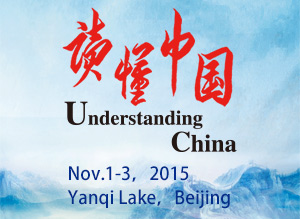
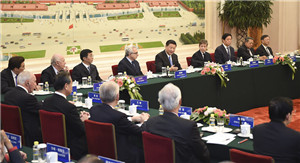
The 2nd "Understanding China" ConferenceOn November 1~3, 2015, the 2nd “Understanding China” Conference was held in Beijing Yanqi Lake International Conference Center. Zhang Gaoli, Vice Premier of the State Council, attended the opening ceremony.
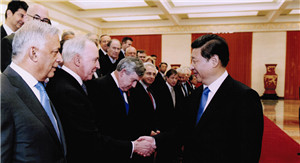
The 1st "Understanding China" ConferenceOn November 1~3, 2013, the 1st “Understanding China” Conference was held in Beijing, which was cosponsored by China Institute for Innovation & Development Strategy (CIIDS), Chinese People’s Institute of Foreign Affairs (CPIFA), and Berggruen Institute on Governance.
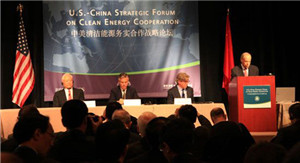
The 2nd U.S.-China Strategic Forum on Clean Energy CooperationWith the “Prospects for U.S.-China strategic cooperation in next decade” as its theme, the forum dwells on the implications of U.S.-China cooperation from the strategic perspective of coping with global challenges and maintaining world peace.
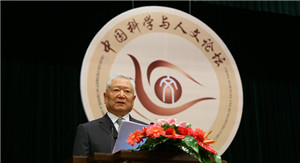
The China Sciences and Humanities ForumCo-initiated in April 2003 by renowned Chinese scientist Mr. Lu Yongxiang and influential political strategist Zhen Bijian, China Sciences and Humanities Forum was jointly hosted by Graduate University of Chinese Academy of Sciences (GUCAS) and the Higher Education Press.

